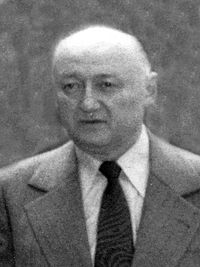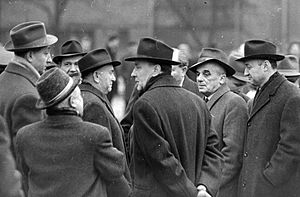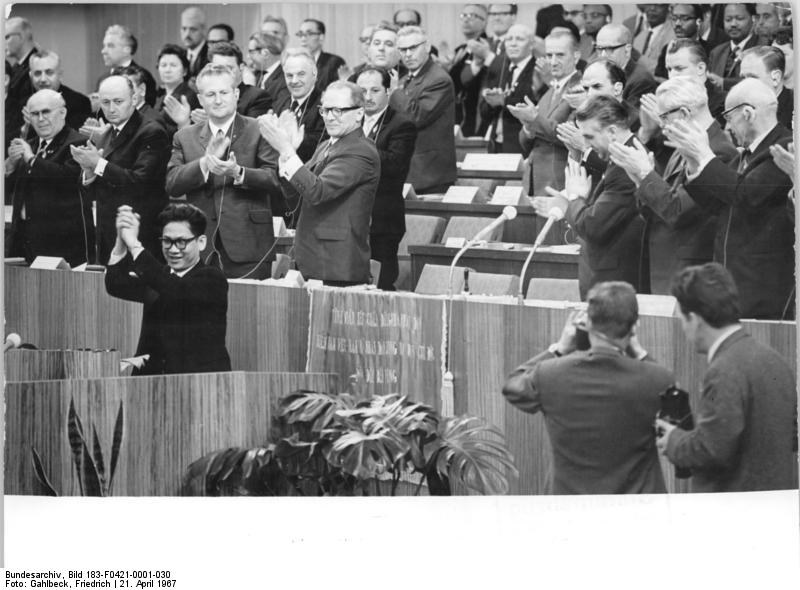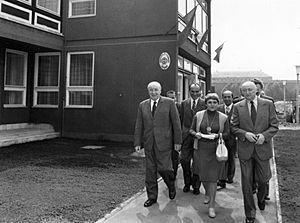Béla Biszku facts for kids
Quick facts for kids
Béla Biszku
|
|
|---|---|

Béla Biszku in 1985
|
|
| Minister of the Interior | |
| In office 1 March 1957 – 13 September 1961 |
|
| Preceded by | Ferenc Münnich (in 1956) |
| Succeeded by | János Pap |
| Personal details | |
| Born | 13 September 1921 Márokpapi, Hungary |
| Died | 31 March 2016 (aged 94) Budapest, Hungary |
| Political party | MKP (1944–1948) MDP (1948–1956) MSZMP (1956–1989) |
| Parents | György Biszku Etelka Debreczeni |
| Profession | politician |
Béla Biszku (born September 13, 1921 – died March 31, 2016) was a Hungarian politician. He was part of the communist government. He served as the Minister of the Interior from 1957 to 1961. Later in his life, he faced legal questions about his role during the difficult times after the Hungarian Revolution of 1956. He was the first high-ranking official from the communist era in Hungary to be legally questioned for his political actions.
Early Life and Beginnings
Béla Biszku was born in a village called Márok (now Márokpapi) in Hungary. This was on September 13, 1921. His parents, György Biszku and Etelka Debreczeni, worked on farms.
After finishing school, he started learning to be a locksmith in 1937. By 1938, Biszku was active in a youth group for metalworkers in Budapest. He worked at different factories until 1945. In 1943, he joined a trade union for metalworkers. A trade union is a group that helps workers.
In 1944, Biszku joined the Hungarian Communist Party. He took part in a resistance movement in Budapest. This group fought against the Nazi German forces and a pro-fascist government called the Arrow Cross Party during World War II. After the war, he helped organize the Budapest Police. He also helped set up a local branch of the communist party.
Political Journey
Biszku quickly moved up in the communist party. By 1949, the party had created a system where only one party ruled the country. This was similar to the system in the Soviet Union. Biszku worked in different party roles. In 1955, he became the First Secretary of a party branch in Budapest.
During the Hungarian Revolution of 1956, a big uprising happened against the communist government. Biszku helped gather armed groups of party members and workers. These groups supported the government against the people fighting for freedom. After the revolution was put down, he received an award in 1958.
From 1957 to 1961, he was the Minister of the Interior in the government led by János Kádár. In this job, he was known for being very strict in dealing with people after the 1956 revolution. This revolution was one of the biggest protests against communist rule in Eastern Europe.
From 1961 to 1962, Biszku became a deputy prime minister. He was also elected as a Member of Parliament (MP) in 1958. He served as an MP until 1971. From 1962 to 1978, he was a Secretary of the Central Committee of the Hungarian Socialist Workers' Party. This was a very important role in the party.
Biszku was a "hard-line" communist. This means he believed strongly in the original communist ideas. He did not like the "New Economic Mechanism" (ÚGM) that the government introduced in 1968. This new plan included some ideas that seemed like capitalism. In 1972, Biszku tried to change the country's direction. He wanted to bring Hungary back to a stricter Soviet-style way of governing. However, his efforts were not successful, and he slowly lost his power. He was an MP again from 1975 to 1985.
In 1978, he was asked to retire from his main party role. He then worked for the National Council of Trade Unions until 1989. In the 1985 election, he lost his seat in Parliament.
Later Years
After communism ended in Hungary around 1989, Béla Biszku lived a quiet life. For many years, he was not questioned about his past actions.
In 2008, a filmmaker named Fruzsina Skrabski started looking for former communist politicians. She and Tamás Novák made a documentary film about Biszku. In the film, Biszku shared his views on the 1956 revolution. He called it a "counter-revolution." He also said he did not feel bad about the tough actions taken by the government at that time. He believed that Imre Nagy, who was the prime minister during the revolution, had "deserved his fate."
Biszku first agreed to the film being shown. But after it got a lot of attention, he changed his mind. His family also tried to stop it from being shown. However, the film, called "Crime Without Punishment", was shown in June 2010. Later, Biszku's daughters supported the film's showing. The Hungarian Parliament also supported showing historical documentaries.
Images for kids
 | Valerie Thomas |
 | Frederick McKinley Jones |
 | George Edward Alcorn Jr. |
 | Thomas Mensah |






